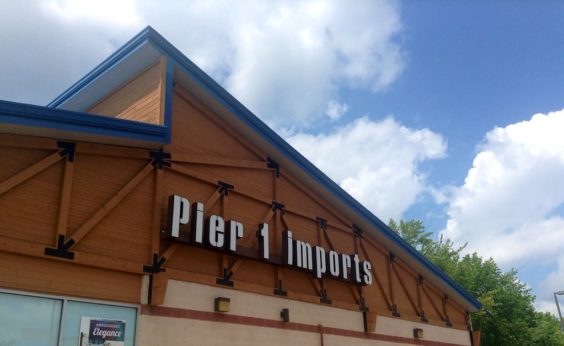
Yet another shopper is taking a retailer to court for allegedly overcharging couponers. But what might appear to be an open-and-shut case could be anything but.
This time, it’s the home furnishings retailer Pier 1 Imports that finds itself the defendant in a lawsuit that accuses it of improperly charging sales tax on items purchased with coupons – conduct that the lawsuit blasts as being “wanton, wrongful, reckless… illegal, unjustified, outrageous and intentional”. Altogether, the lawsuit estimates that “the overcharges will exceed several million dollars, at a minimum”.
Carol Finlon of Irwin, Pennsylvania said she purchased multiple items at two Pittsburgh-area Pier 1 stores, and both times she was charged sales tax on her full total, and not the discounted total after her coupons were deducted.
Different states have different laws about whether the value of manufacturer’s coupons is subject to sales tax. But all states exclude store coupons from sales tax. So according to Pennsylvania’s tax law, Finlon’s store coupons should have been deducted from her total before the amount of sales tax was calculated.
But that’s not what happened, her lawsuit states. The case mentions two specific shopping trips, beginning with one in February. Finlon purchased $39.92 in merchandise, using a $20 store coupon. But the store charged her $2.79 in sales tax on the pre-coupon total, rather than $1.39 on the post-coupon total. Several months later, Finlon visited a different local Pier 1 store. This time, she purchased $99.83 in merchandise, using a $30 coupon, and was once again charged sales tax on the pre-coupon total.
In such cases, “the retailer is unequivocally required by the Pennsylvania Department of Revenue Tax Regulations to exclude the amount of the discount from the calculation of sales tax to be charged and collected on the customer’s purchase,” the lawsuit states. By flouting those regulations, “Pier 1 benefits from these overcharges, as it receives a commission on the taxes it charges and collects, thus incentivizing excessive collection of taxes in order to increase its commission.”
Finlon’s proposed class action suit levels a number of accusations against Pier 1, including misappropriation, conversion, unjust enrichment and violating the state’s Unfair Trade Practices and Consumer Protection Law.
But a similar lawsuit filed in Pennsylvania against BJ’s Wholesale Club several years ago ran into a number of roadblocks. Two shoppers who used coupons and were charged sales tax on their pre-coupon total, sued the store. But they were told they would have to apply for a refund from the state.
And then the state denied their refund request. According to Pennsylvania tax law, a cash register receipt must “make a clear reference to the item and the coupon related to it” in order for the coupon’s value to be deducted from the taxable total. But on the plaintiffs’ receipt, the use of a coupon was indicated at the bottom of the receipt, with no reference as to which product the coupon was used on. So the state argued that, according to the letter of the law, sales tax was properly assessed on the pre-coupon total.
Finlon’s lawsuit seems to anticipate this argument, by pointing out that the tax law also says coupons must be excluded from sales tax if the receipt makes “a clear reference that there is an amount deducted on any purchase or a percentage discount on all items listed”. Finlon’s receipts did not indicate whether her coupons were applied to any specific products, but her lawsuit says that doesn’t matter.
Of course, the state could argue that her lawsuit doesn’t matter, either. Many similar cases in other states have been tossed out, after courts found that shoppers’ only recourse in such a situation is to apply for a sales tax refund from the state, not sue the retailer that collected the sales tax on the state’s behalf. A spokesperson for the Pennsylvania Department of Revenue even said once that state law merely “allows” retailers to charge sales tax on a shopper’s post-coupon total, but the state “cannot legally require retailers to do it.”
So the odds seem stacked against Finlon from the start. But there’s at least one ray of hope – regardless of whether it’s in the right, Pier 1 may decide it’s not worth a lengthy court battle. That’s what Walmart decided in a Pennsylvania coupons-and-sales-tax lawsuit last year. Walmart agreed to settle a class action lawsuit brought by a Pennsylvania shopper who said he was charged sales tax on the full value of items purchased using coupons. Any shopper in the state who was similarly overcharged during the claim period is eligible for a gift card worth at least $30 as compensation.
So Finlon may not win an argument with a state that seems to shrug off instances of retailers disregarding tax law. But she may have better luck hoping that Pier 1 is receptive to settling the lawsuit rather than fighting it. Otherwise, pursuing a lawsuit that ends up getting tossed out like so many others before it, means that the few extra dollars she paid in excess sales tax could end up costing her a whole lot more.











Read above.
On June 8, 2020 I took a really bad fall at Pier 1. I was told that Pier 1 only paid if a customer fell inside the store. This is crazy. They have two handicap parking spaces which are located at the end of the parking. If you want to use the walkway, you need to walk behind the cars to find the walkway. Most people just step up on the sidewalk 7″ high. which is where you get to the front of entrance of store. Anyway, this store is not what they appear to be. I should have know when I would spend 1,000’s of dollars at this store and was given excuses as to why I couldn’t get anything back. I was left holding the medical bills and health problems. I believe that I was not the only one who was suckered. They are nice when we shop there but, beware if something happens! The managers and higher ups will turn on a dime and hang you out to dry. Maybe going out of business has to do with customers getting smart to their techniques. Shame on Pier 1.